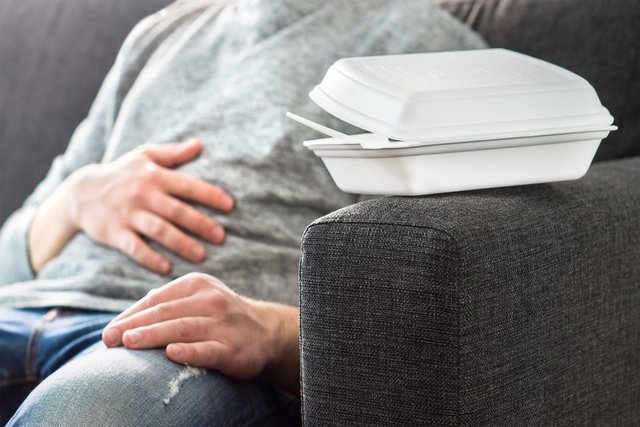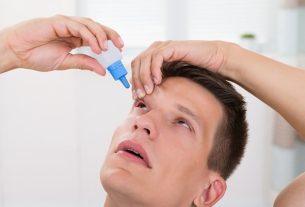Poor digestion is a situation that can occur after consuming very fatty foods or when drinking a lot of liquids during a meal, which slows down digestion and causes the appearance of symptoms of poor digestion, such as a feeling of a full stomach, gas. , abdominal discomfort, frequent burping and nausea.
It is recommended to go to the doctor when the feeling of a full stomach is frequent, with daily episodes, or when they occur more than 8 times a month. In these cases, the doctor can evaluate the symptoms presented by the person and analyze eating habits, in addition to recommending tests to rule out other causes of the symptoms.
In case of poor digestion, it is recommended that the person eat a lighter diet, avoiding very fatty and processed foods. Furthermore, it may be interesting to consume teas with digestive properties, such as boldo tea or anise tea, as long as they are recommended by your doctor, to alleviate symptoms.

Symptoms of poor digestion
The main symptoms of poor digestion are:
- Feeling of a full stomach, even after eating little;
- Gases;
- Abdominal discomfort and bloating;
- Heartburn and burning;
- Frequent burping;
- Nausea and vomiting;
- Diarrhea or constipation;
- Headache;
- Tiredness.
In the presence of frequent symptoms of poor digestion, it is important that the gastroenterologist is consulted so that an evaluation can be carried out and medications can be indicated to help alleviate the symptoms, in addition to measures being indicated that help prevent the development of anemia and lack of vitamins, as poor digestion can interfere with the absorption of nutrients in the intestine.
Main causes
Poor digestion is usually related to eating habits, being more common in people who consume more fatty and processed foods and meats, as the digestion process of these foods is more difficult, resulting in the appearance of symptoms.
Furthermore, symptoms of poor digestion can also occur when you consume a lot of liquids during a meal, as the stomach volume increases, making digestion slower.
This situation can also be a consequence of eating too quickly, not chewing food properly, which directly interferes with the digestive process.
When to go to the doctor
It is recommended to consult a gastroenterologist or general practitioner when the feeling of poor digestion is frequent, occurring more than 8 times a month. Furthermore, it is recommended to go to the doctor when symptoms such as weight loss, blood in the stool or difficulty swallowing are noticed.
During the consultation, the doctor will evaluate the symptoms and recommend tests to help identify the cause of poor digestion, such as digestive endoscopy.
What is the treatment like?
Treatment for poor digestion should be indicated by a gastroenterologist or general practitioner according to the symptoms presented by the person and the cause of poor digestion. Therefore, the use of some medications may be recommended to alleviate symptoms and improve digestion, such as Gaviscon, Mylanta plus and Eparema, for example.
There are also some home and natural remedies that also have digestive properties and that could be recommended as a way to complement the treatment recommended by the doctor, such as milk of magnesia, boldo tea and anise tea.
Another good option is to eat a slice of pineapple or drink about 50 ml of its pure juice, without adding water to dilute it, as it facilitates and speeds up digestion, especially of fatty meals. See what to take for poor digestion.
What to eat
The diet to combat the feeling of a full stomach should mainly include foods that are easy to digest and do not irritate the stomach, such as fresh fruit without skin and seeds, cooked vegetables, natural fruit juices, bread and biscuits without filling.
Foods that should be avoided are especially those that contain a lot of fiber and that stimulate the production of gases, such as leafy green vegetables, beans, eggs and processed foods rich in fat such as butter, cottage cheese, milk and red meat.
Furthermore, it is also important to avoid industrialized and processed foods, as they tend to be rich in fat and preservatives that irritate the intestine.
How to avoid symptoms of poor digestion
Some recommendations to improve digestion and prevent the appearance of symptoms are:
- Maintain a regular meal schedule;
- Eat calmly and chew food well;
- Keep your spine straight when eating;
- Eat regularly, on average every 3 hours, and in small quantities;
- Avoid stressful and agitated situations;
- Avoid smoking and consuming alcoholic beverages and coffee, in some cases;
- Reduce the consumption of gum, as it can promote swallowing of air;
- Avoid physical activity immediately before or after meals.
It is also recommended to avoid drinking liquids during meals and immediately after eating.
Bibliography
- VF Moreira and A. Lopez San Roman. Functional dyspepsia. Scielo. 2004
- M. Transit Lopez Luengoa. Treatment of common digestive disorders. ELSEVIER. 2013

Sign up for our newsletter and stay up to date with exclusive news
that can transform your routine!
Warning: Undefined array key "title" in /home/storelat/public_html/wp-content/plugins/link-whisper-premium/templates/frontend/related-posts.php on line 12
Warning: Undefined array key "title_tag" in /home/storelat/public_html/wp-content/plugins/link-whisper-premium/templates/frontend/related-posts.php on line 13




